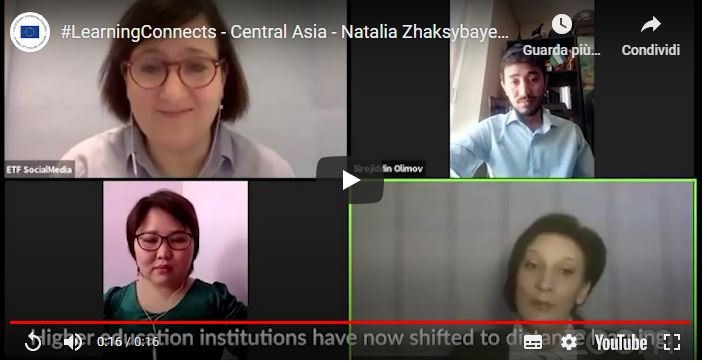
Teachers' experience in Central Asia during the COVID-19 crisis
Interviews with vocational teachers from Kazakhstan, Kyrgyz Republic, and Uzbekistan
Three teachers from Kazakhstan, the Kyrgyz Republic, and Uzbekistan respectively, shared with the ETF their experience in overcoming the challenges of teaching during lockdown as part of our #LearningConnects campaign.
Watch the video clips and read the full article on the interviews on the ETF’s OpenSpace or scroll down for a summary of discussions.
Central Asia escaped the worst of the coronavirus pandemic, with infections and mortality numbers lower than many other countries, but the ability of VET systems to respond to the needs of teaching under quarantine varied widely across the region. All countries have taken a range of measures that have interrupted normal education.
The sophistication and preparedness of the countries varied, with Kazakhstan - the richest nation in the region - better equipped for making the online transition. Nevertheless, all three VET teachers reported common responses, with individual colleges initially struggling to produce fresh materials for online teaching, support from government ministries to bring teaching to all children and young people through television channels, and the willingness of providers to step in to offer free Internet access for learners and teachers. A much closer relationship with parents has also been a common experience across the countries.
Natalia Zhaksybayeva, is a teacher of special disciplines from the Central Asian Technical and Economic College, Almaty, Kazakhstan, a college of 800 students that specialises in IT and communication. She described how the switch to online learning went relatively smoothly as distance-learning methods had been employed within the vocational education and training system already for some years. The main challenge of moving fully online was in deciding which platform to use for which the final decision was made based on simplicity, ease of use and system compatibility across the country.
Elnura Kyzy from Bishkek, Kyrgyz Republic, a teacher and Deputy Director of Lyceum 98, a professional college of information and technology explained how teachers from the college were quickly operational and used video seminars from the first day of quarantine. Support was also provided by the national agency for professional technical education for teachers on the use of online material and platforms for distance learning. For them the main issue was ensuring good internet connections especially as many people moved to the countryside during lockdown.
For Sirozhiddin Olimov, on the other hand, a teacher of the Academic Lyceum of Tashkent, Uzbekistan, many teachers had not been involved in distance learning prior to lockdown so the transition was more challenging. The school gathered together a group of teachers who understood technology to decide how to proceed and which tools to use.
As for the future, although all three interviewees emphasised the importance of traditional face-to-face classes - which are of particular value for inculcating social skills - they agree that aspects of online learning are here to stay in vocational education and training in Central Asia.
Did you like this article? If you would like to be notified when new content like this is published, subscribe to receive our email alerts.